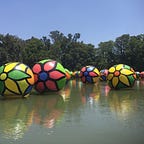Moana, a hero to all children of color
Moana, a strong independent woman that does not need a man.
Disney has finally released a movie with a Princess of Color that does not fall in love nor spends the whole film searching for her true love. Moana is the daughter of a Chief on Island Motunui and she has a passion for adventures and sailing the ocean. I was excited for Moana to be released because I was happy to see an addition to the few Princesses of color Disney has and also because Moana goes against the Disney norm love story. Disney romance movies can be too overrate for my young daughter because she will quickly believe that she needs to find herself a prince, change herself so her prince can love her, and live happily ever after in a patriarchal society. I was excited for Moana to be released because I thought finally a Disney character my daughter can relate to appearance wise. Moana is brown female with frizzy hair and a thick body which goes against the typical Disney Princess (white, thin, and long silky straight hair). My daughter watches Moana at least three times a day, so by now, I know the movie word for word and I have the Moana soundtrack stuck in my head all day. While my daughter watches the movie and sees the bright beautiful colors, hears the catchy songs, and laughs at the dumb chicken, I am analyzing the entire movie from a feminist perspective. I give Moana props for going against her father’s commands by sailing across the ocean, for not depending on any man to achieve her goals, and for being determined to save her island from dying.
Moana is shown as a baby attracted to the ocean and her curiosity for what is on the other side of the ocean grows as she gets older. However, Moana’s dad is constantly holding her back from exploring outside of the ocean which makes Moana want to sail the ocean even more to see what is out there. Just like patriarchy, Moana’s dad is holding her back from wanting to be independent and making her stay on the island to serve her people.
“Children make the best theorists, since they have not yet been educated into accepting our routine social practices as “natural.” Bell Hooks states.
The Princess of color, Moana, perfectly represents Hooks’ statement. Moana was always told that the ocean was too dangerous to sail and in order to keep the people on the island safe, everyone has to stay on Motunui their whole lives. The people on the island did not question the Chief’s command because they were taught it was “natural” to stay on the island. Moana’s curiosity is what pushed her to sail across the ocean, to return the heart of The Fit, and to save her Island from dying. Moana’s father, the Chief of the island, is seen in the movie preventing Moana from becoming her own person and he is seen trying to mold her into the daughter he believes she should be. However, Moana bravely goes against her dad’s belief because she knows deep down that being a princess serving to the people is not who she truly is. Children have curious minds that make them have high hopes and beliefs, children do not understand the reasoning adults/parents make, but regardless, children are so determined to succeed in everything they do.
Moana struggled with her father trying to control her and she struggled with Maui trying to convince her that she is not capable of returning the heart to The Fiti. Against all the odds Moana encountered, Moana continued through the journey because she was determined to change the everyday lives of her people. Moana is an inspiration to young children because she showed that curiosity and motivation allows one to succeed. Moana showed that only we know who we truly are and no one, especially men, can tell us who we are or tell us what we can/cannot do.
